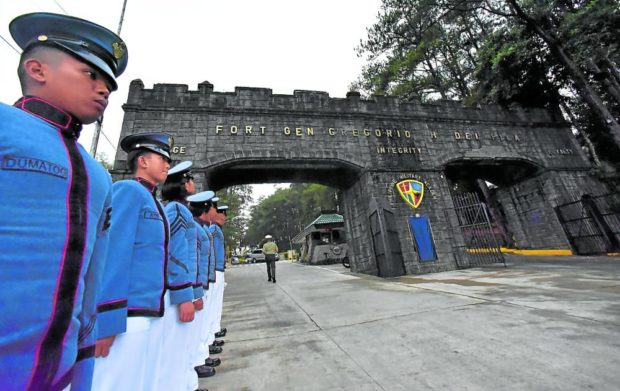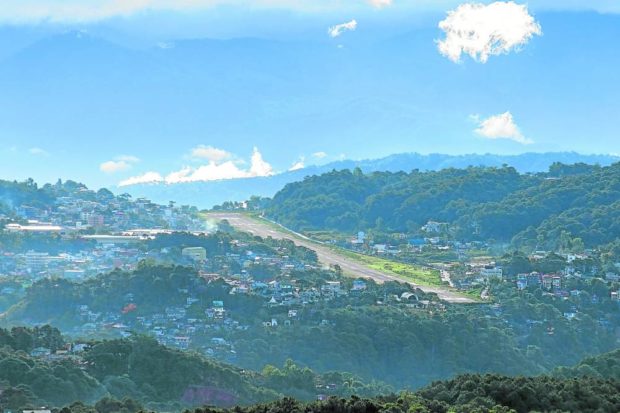2 farmers get 10 days in jail for encroaching on PMA land

PRESERVATION | The Philippine Military Academy, its main entrance shown in this 2019 photo, has gone to court to preserve its military reservation in Baguio City from settlers. The PMA recently won two court cases against ancestral land claimants and occupants of its Navy Base reservation, also in the summer capital. (File photo by EV ESPIRITU / Inquirer Northern Luzon)
BAGUIO CITY, Benguet, Philippines — For their “unlawful entry” into the military reservation of the Philippine Military Academy (PMA), two Ibaloy women were each meted a 10-day jail sentence and fined P100 by a local court amid a land dispute between the military school and ancestral land claimants.
Cherilyn Amistad and Brenda Takinan, heirs of Gusec Chacchacan (also spelled Dacdacan), were penalized for clearing and farming sections of a 282,951-square-meter lot within the PMA, which they claimed as their ancestral land.
The PMA sued them for putting up a “kalapaw” — a communal work shed — on May 4, 2021, and for allegedly supervising illegal land activities inside its forested perimeter at Barangay Loakan, one of the oldest Ibaloy settlements in the city.
In a Jan. 19 decision that was sent to the city council last week, Judge Roberto Mabalot of the Municipal Trial Court in Cities (MTCC) Branch 1 ruled that the women “have no clear and unmistakable right over the subject properties [and] therefore there is an invasion of a right that needs to be protected.”
The PMA has gone to court against different settlers within its territory to secure the military’s properties in Baguio, said the academy’s legal officer, Lt. Col. Maria Elena Esteban, on Tuesday.
Article continues after this advertisement
MILITARY LAND | The forested area at right, near the Baguio City airport in Barangay Loakan, is part of the military reservation overseen by the Philippine Military Academy. (Photo by NEIL CLARK ONGCHANGCO)
Pushback
In an interview, Esteban said the PMA won a second lawsuit in January after a regional trial court (RTC) nullified four land titles issued at Navy Base, another military reservation that is under the academy’s proprietary control.
Article continues after this advertisementBaguio RTC Judge Modesto Bahul Jr. directed the Baguio Register of Deeds to cancel the titles which were within a military reservation and were therefore “void and cannot be validated.” The decision was issued on Jan. 12 but was relayed to the PMA only last week.
The military reservation now hosting the PMA was first segregated after World War II based on a 1948 survey marking its boundaries.
The Fort del Pilar reservation was officially reserved for military purposes in 1985 through Proclamation No. 2405 which was issued by the late President Ferdinand Marcos Sr.
But Amistad and Takinan asserted in the MTCC trial that their ancestor, Chacchacan, and his descendants have had “peaceful, notorious, continuous and exclusive possession” of the disputed land south of the Baguio airport in Loakan for the past 250 years, according to court documents.
They said the family had been paying tax declaration fees for their ancestral land, which was endorsed by the Department of Environment and Natural Resources for a certificate of ancestral land claim in 1992.
Amistad and Takinan also informed the court that the family applied for a certificate of ancestral land title with the National Commission on Indigenous Peoples in 2013, and had begun land developments on the strength of their “native title.”
The native title is a reference to the landmark 1909 US Supreme Court decision that recognized the land rights of Ibaloy chieftain Mateo Cariño over American-sequestered land that is now Camp John Hay.
Amistad and Takinan presented a survey plan of the disputed property that was dated July 28, 1961, to establish that their family had possession of the land before Proclamation 2405 was issued. They have yet to serve their sentences after appealing Mabalot’s decision, said Rosella Camhit, the women’s cousin.
In his ruling, Mabalot also cited the 2019 Supreme Court decision that the Baguio Charter “governs the determination of land rights within Baguio City and not Ipra (Indigenous Peoples’ Rights Act of 1997, or Republic Act No. 8371).”